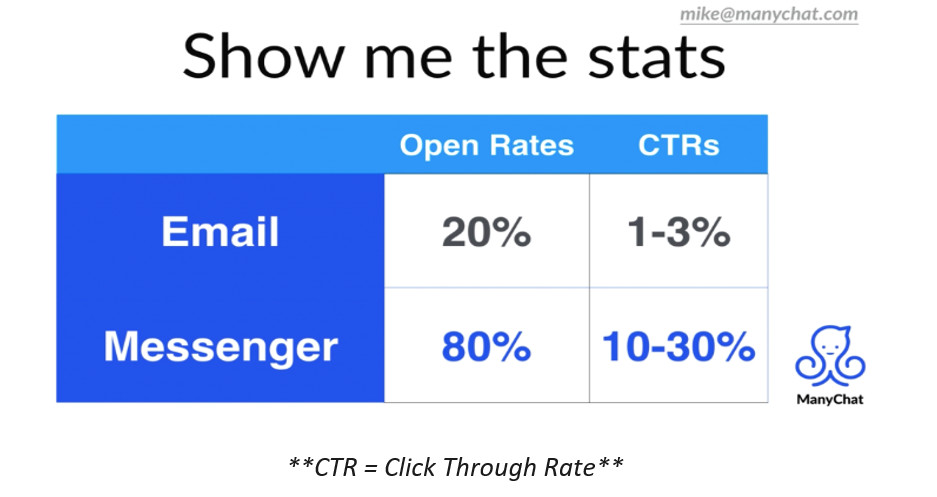Chatbots: Three benefits to your small business
)
Posted: Thu 14th Sep 2023
9 min read
Chatbots can be a powerful tool for small business owners to build their brand.
Here, Enterprise Nation member Andy Wilkins from Chatamo shares top tips for growing a small company using automated voice and chatbots.
What is a chatbot?
A chatbot is software that automates and simulates a conversation with humans, typically over messaging apps or as an embedded feature on a company's website.
What that means in plain English... If you use a messaging app like WhatsApp or Facebook Messenger to message your friends, you can also add 'artificial' contacts that you can chat with. These contacts aren't human, they're computers (or 'bots') and they let you have a chat with them about the company or product they represent.
Why are chatbots becoming so popular?
The growing popularity of chatbots is thanks to one major trend happening at the moment: the growth of messaging apps.
More than three billion people every month use messaging apps like WhatsApp, Facebook Messenger, WeChat and Viber. This is staggering when you think social networks themselves like Facebook don't even get those numbers of users.
With their huge popularity, businesses are realising the potential of messaging apps as a major new channel for sales, customer service and marketing.
As people are flocking to messaging apps in their droves, it makes sense to use these channels to interact with your customers.
Key benefits of chatbots
Automate elements of your marketing, sales and support. Most service-based businesses employ sales and support people to look after their customers and answer customer questions. Chatbots can steer customers towards what they're looking for.
Can communicate with customers 24/7 and in any language. So, not only would this improve your customer service in terms of availability, it means you can deliver a service on all channels at a fraction of the cost.
Better understand your customers. The apps provide real-time insights through the valuable data they collate.
Don't take up valuable space on devices. Businesses are constantly challenged to get their voice to be heard. A quarter of all downloaded apps are abandoned after a single use. Chatbots sit within all of your customers messaging apps which they use every day – they don't take up valuable space and don't get deleted.
Becoming a preferred method of communication. Stats show that approximately 45% of end users prefer chatbots as the primary mode of communication for customer service inquiries.
Examples of how you can use chatbots
There are a growing number of platforms that allow you to build and deploy a chatbot at no (or low) cost and with no coding experience required.
Many chatbots these days prove non-technical software is extremely easy to use and makes building and deploying a bot possible in a matter of minutes. Here are three examples of how you can use chatbots to help your business.
Customer FAQ chatbot
Any business owner will agree that time is their most valuable asset. There are ways to save time, and here's precisely where a chatbot can help.
Over the course of a year, how many times have you answered the same question? A customer gets you on the phone, texts you, emails or asks you a question through your website. Imagine for a second if every time a question was asked on these channels and more, you could give an automated reply.
How could a chatbot help?
Chatbots can help you field commonly asked customer questions that you've responded to dozens of times already. Tell the bot what to say when customer asks X, and next time someone asks, the bot answers on your behalf.
Newsletter chatbot
If you have an email newsletter, you'll no doubt have a love-hate relationship with it. It's a lot of work to get them out and with open rates on the average newsletter no higher than 25%, is all the work you put into it worth it?
The problem is that we all receive too many emails, and people tend to be very selective about the ones they open and read. The reality is: newsletters don't work as well as they could.
How can chatbots help?
An amazing feature of chatbots is their two-way connectivity. Using one, a business can broadcast news directly to its customer, using the messaging channel of their choice.
Although the content is lighter, you can easily accommodate up to 10 different stories on a single message, and incorporate images, links and even videos.
It takes minutes rather than hours, and the best bit? Chatbot messages have an incredible open rates. Check out these stats shared by ManyChat:

Lead generation chatbot
Business development or generating leads is another must-do activity for most businesses. But the same goes for lead generation as it goes for newsletters: people typically ignore lead gen emails.
I get dozens of cold outreach emails – 99% of which I ignore. It's hard to get excited by random emails, especially when you have zero rapport with the sender.
Contrast that with a company that has already given me value in some shape or form. I'd be far more inclined to pick up the phone.
How could a chatbot help?
The best way to build an audience quickly that doesn't entail the super saturated email channel is through messaging channels.
Delivering content via a chatbot is a novelty. Most businesses don't even know you can do it. We're accustomed to opening messages from friends on messaging apps, but businesses are only now starting to catch up.
If I use Facebook Messenger as an example, how would you get people to engage with your Messenger chatbot in the first place?
That's the easy bit. You could run Facebook Ads to get people to engage with one of Facebook's new 'click to messenger' ads, then once they're on Messenger you can build your audience there – all automated, in any language and 24/7.
Final thoughts
The central message here is that chatbots are allowing businesses to thrive in a whole host of ways. Furthermore, the three examples I've given are only the tip of the iceberg. If you look online, you'll find blog after blog about the vast menagerie of unique and nuanced ways to use a chatbot.
However, the three listed here are the most straightforward and instantly effective. So, what are you waiting for? Try it for yourself, see the results, and all the while learn fascinating insight into your customers' behaviour.
Relevant resources
Make your small business more productive with the free Tech Hub tool
Get tailored recommendations, join virtual workshops, connect with expert advisers and find practical resources. Take me to Tech Hub now
Get business support right to your inbox
Subscribe to our newsletter to receive business tips, learn about new funding programmes, join upcoming events, take e-learning courses, and more.
Start your business journey today
Take the first step to successfully starting and growing your business.
Join for free

